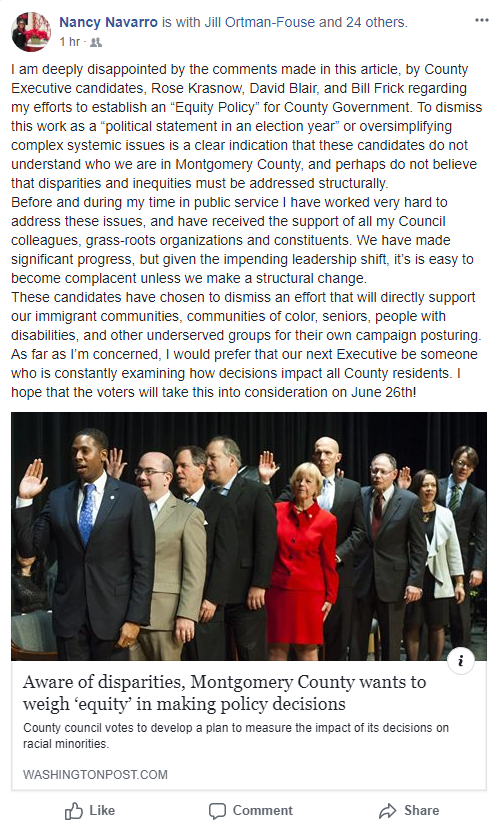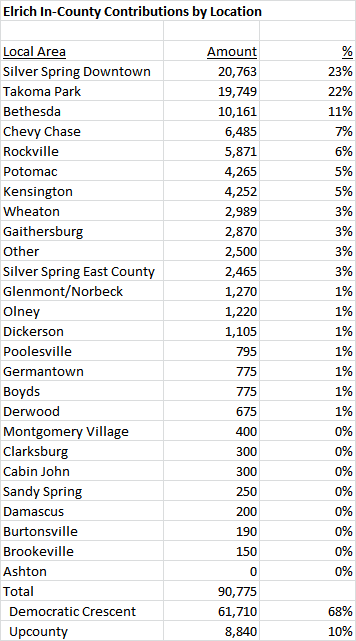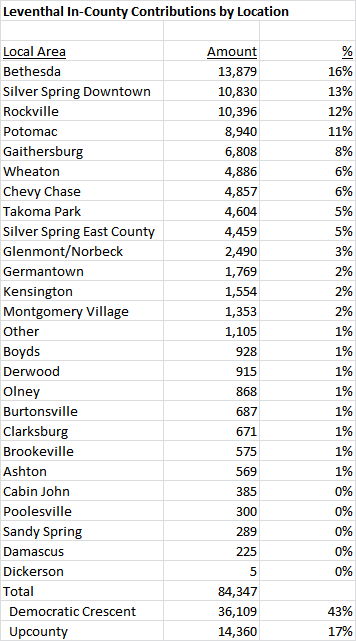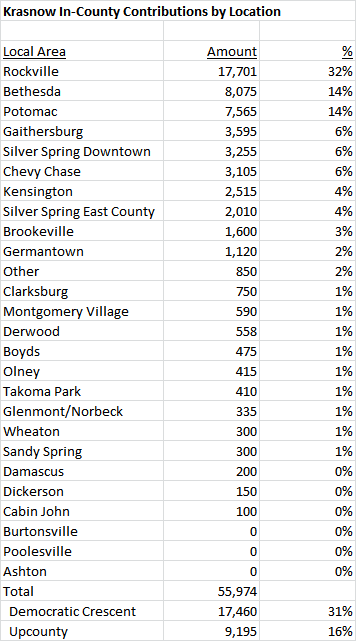By Adam Pagnucco.
County Council Member Nancy Navarro is blasting County Executive candidates Rose Krasnow, David Blair and Bill Frick over their comments on her racial equity resolution. The council resolution would have the county measure racial equity impacts of budget items and legislation. Its action language states:
The Council is committed to examining the data needed to develop an equity policy framework that would require the County to question how budget and policy decisions impact equity.
This effort must be a partnership between the County Council, County Executive, County Government, county agencies, institutions, and our community. The County Government
must challenge itself to bring new and different partners to the table. Partnering with other jurisdictions as members of the Government Alliance on Race and Equity (GARE) will also enhance the County’s effort and commitment to fostering equity.Equity analyses should be part of capital and operating budget reviews, appropriation requests, and legislation. Program and process oversight should be undertaken viewing programs and processes through an equity lens. Equity targets and measures of progress must be put in place.
The Council will provide additional FY19 Operating Budget resources for the Office of Legislative Oversight to develop a baseline report describing current disparities in education, employment, housing, health, employment, land use, and other measures of opportunity by May 31, 2019. Following the transmittal of the baseline report, the Council will introduce legislation for the County to develop an equity policy framework to inform the delivery of all County services.
The entire council, including the three members running for Executive (Roger Berliner, Marc Elrich and George Leventhal), has co-sponsored the resolution. But fellow Executive candidates Rose Krasnow, David Blair and Bill Frick criticized it in the Washington Post:
Democrat Rose Krasnow, the county’s deputy planning director and a former mayor of Rockville, said she worried the measure would lead to “paralysis by analysis.” She also questioned the timing of the resolution: “It seems like such a political statement in an election year.”
Del. C. William Frick (D-Montgomery) said growing “private-sector jobs” and wages is the best way to eliminate disparities. Businessman David Blair applauded the vote but the Democrat wrote in an email that “we shouldn’t confuse activity with progress. . . . Where’s the progress been the past 12 years?”
That drew Navarro’s wrath. She denounced the three candidates on Facebook, writing:
I am deeply disappointed by the comments made in this article, by County Executive candidates, Rose Krasnow, David Blair, and Bill Frick regarding my efforts to establish an “Equity Policy” for County Government… These candidates have chosen to dismiss an effort that will directly support our immigrant communities, communities of color, seniors, people with disabilities, and other underserved groups for their own campaign posturing. As far as I’m concerned, I would prefer that our next Executive be someone who is constantly examining how decisions impact all County residents. I hope that the voters will take this into consideration on June 26th!
We see Navarro’s point. Montgomery County, like the rest of the United States, is rife with inequities of all kinds. Navarro’s resolution does not prescribe specific remedies; it only initiates the process of measuring inequities so that they can be considered in public policy decisions. It’s hard to understand how any progressive candidates for office could oppose that. Perhaps Krasnow, Frick and Blair would like to comment further before their existing remarks are set in stone.







